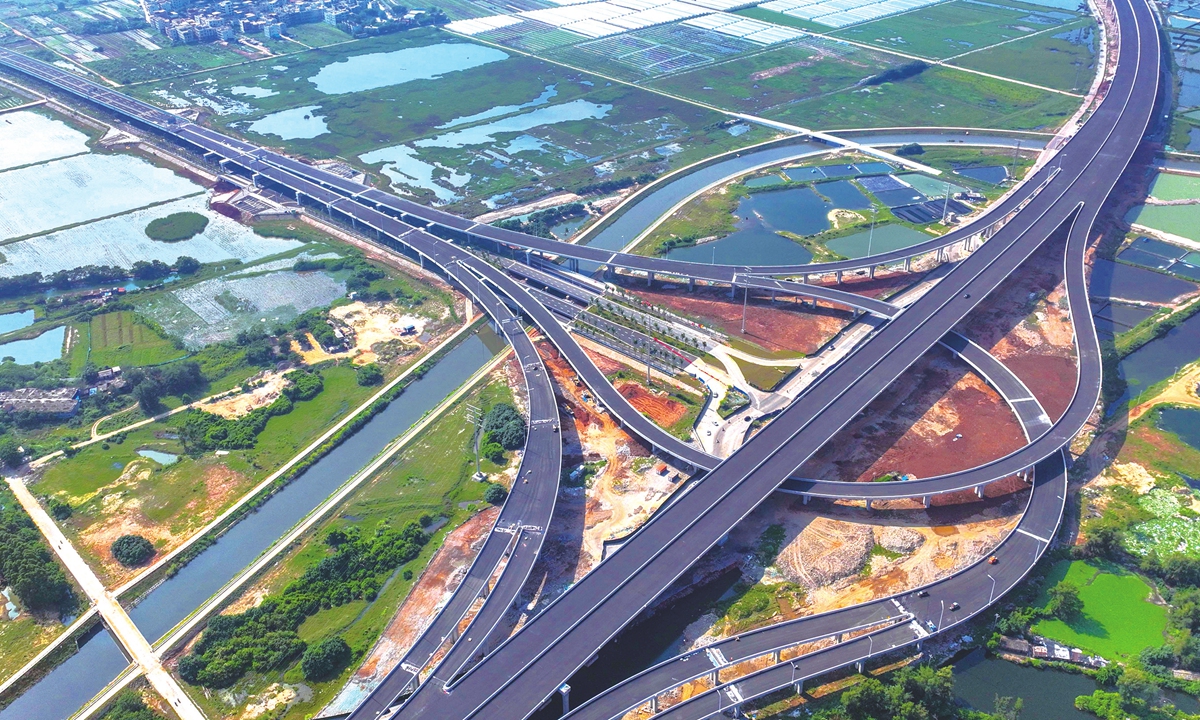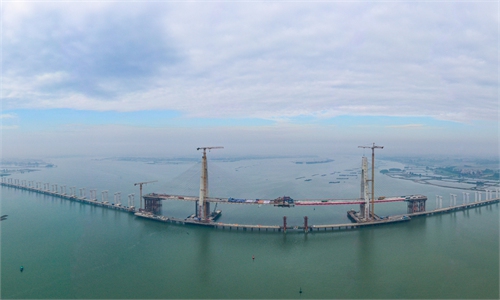China ramps up infrastructure construction at year's start, with more special-purpose bonds in pipeline
More government bonds are planned to augment funding

The Haikou part of the G15 highway in South China's Hainan Province, which is still under construction, is seen on September 14, 2022. It is a major infrastructure project of the Hainan Free Trade Port, and the only channel connecting the expressway in Hainan Province to the national expressway network. Photo: cnsphoto
As the seven-day Spring Festival holidays have wrapped up, many infrastructure projects across China have kicked off. Experts said that massive infrastructure investment will continue this year, which will play a leading role in propping up economic growth.
The groundbreaking ceremony for the Yangpu Binjiang Smart Center in Shanghai began over the weekend. As the starting point of the new phase of Yangpu Binjiang's three-year action plan, and one of the 100 major projects arranged by the Yangpu district in 2023, the project will be the main node of the comprehensive development and construction of Yangpu Binjiang.
And, major infrastructure projects with a total investment of about 50 billion yuan ($7.4 billion) officially started in a centralized manner. A total of 25 major projects including new materials, new energy, and next-generation information technology were announced by the city.
In North China, construction is also back on the fast track. Work started on 43 projects worth 41.6 billion yuan in the Xiong'an New Area, Hebei Province over the weekend, covering infrastructure, public services and smart city facilities.
Infrastructure build-up is expected to continue its strong impetus in 2023 that will help drive economic revival, experts noted.
"The strong start of infrastructure construction is more of continuing the momentum that has picked up since the fourth quarter last year when the investment pace accelerated under optimized COVID-19 management measures," Tian Yun, an independent macro-economy analyst, told the Global Times on Monday.
Reduced prices of raw materials in November and December helped drive fixed-asset investment, Tian said.
"Infrastructure investment and manufacturing investment will remain the two major drivers to propel growth this year, which are expected to grow by 8-10 percent, while the dampened real estate sector will stabilize," Lian Ping, chief economist and head of the Zhixin Investment Research Institute, told the Global Times.
China's fixed-asset investment rose 5.1 percent on a yearly basis to 57.21 trillion yuan in 2022. Investment in infrastructure climbed 9.4 percent and manufacturing was up 9.1 percent, official data showed.
The National Development and Reform Commission (NDRC), China's top economic planner, said in early January that it approved a total of 109 fixed-asset investment projects in late 2022. The projects, with a combined investment value of 1.48 trillion yuan, cover transportation, energy and water conservancy.
In contrast to traditional infrastructure projects such as roads and airports, new digital infrastructure projects range from big data centers to charging piles for electric vehicles, which have more growth potential and help facilitate consumption demand, said Tian.
The country will allocate new funding under the central government's budget after the Spring Festival holidays to support the construction of key basic infrastructure projects, especially information networks in remote regions in the central and western regions, an official of the NDRC said on January 18.
Driven by the supportive policies and the recovery of market demand, it is expected that the growth rate of new infrastructure projects investment will reach 15-20 percent in 2023, playing a major role in stimulating economic growth, according to Wang Qing, chief macro-economy analyst at Golden Credit Rating.
China has been issuing special-purpose bonds to support local infrastructure projects in recent years in its bid to fuel the economy.
Local governments issued a total of 4.04 trillion yuan in special-purpose bonds in 2022, the Ministry of Finance said in a statement on its website on Sunday.
Experts said that special-purpose bond issuances this year will be roughly flat with the level seen in 2022.
"Special-purpose bond investment will be further optimized in structure and be injected into more efficient investment areas," Pan Helin, co-director of the Research Center for Digital Economics and Financial Innovation at Zhejiang University, told the Global Times.
Investment in 5G communications, distributed electricity grids and computing power is expected to rise, according to Pan.




